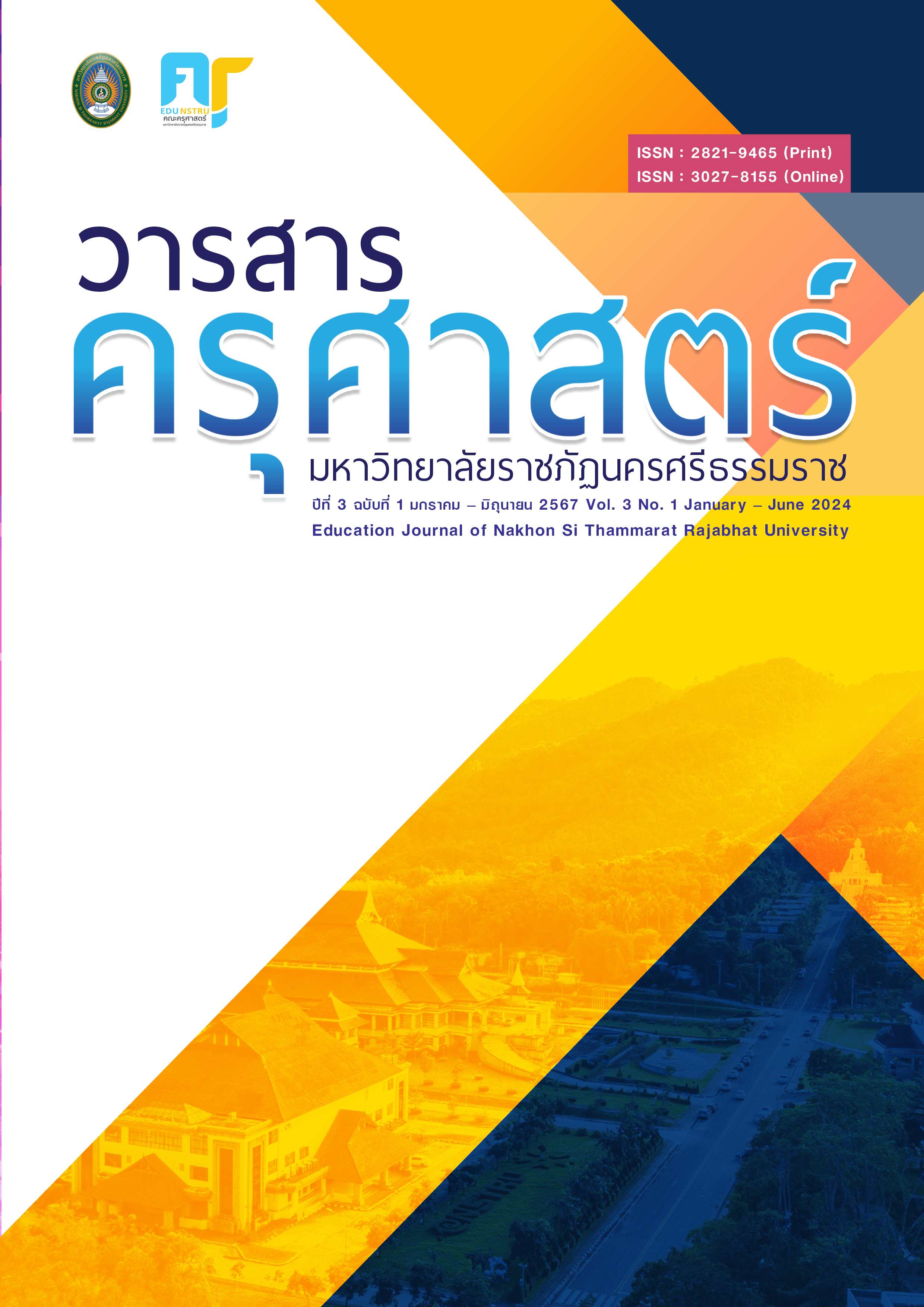The Effect of Task-Based Learning with Information Gap on Enhancing Speaking Skill of Mathayom Five Students
Main Article Content
Abstract
The research was a one group pretest-posttest design. The purposes of this research were to 1) study the effect of task-based learning with information gap on the English speaking skill of Mathayom five students before and after using it, and 2) study the satisfaction of Mathayom five students towards using task-based learning with information gap. The subjects were 33 Mathayom five students studying English 3 course in the first semester of 2023 academic year at Phromkiripittaykom School, selected by purposive sampling technique. The research instruments were 1) 3 task-based learning lesson plans, 2) an English speaking skill assessment form, and 3) a students’ satisfaction questionnaire towards using task-based learning with information gap. The data were analyzed by using mean (x̄), standard deviation (S.D.) and t-test. The results were as follows: 1) English speaking skill of the students after using task-based learning with information gap was significantly higher than before using it at .05 level; and 2) the students’ satisfaction towards using task-based learning with information gap was at a high level.
Article Details

This work is licensed under a Creative Commons Attribution-NonCommercial-NoDerivatives 4.0 International License.
บทความที่ได้รับการตีพิมพ์เป็นลิขสิทธิ์ของวารสารครุศาตร์ มหาวิทยาลัยราชภัฏนครศรีธรราช
ข้อความที่ปรากฏในบทความแต่ละเรื่องในวารสารวิชาการเล่มนี้เป็นความคิดเห็นส่วนตัวของผู้เขียนแต่ละท่านไม่เกี่ยวข้องกับวารสารครุศาสตร์ มหาวิทยาลัยราชภัฏนครศรีธรรมราช
References
Afrizal, M. (2015). A Classroom Action Research: Improving Speaking Skills through Information Gap Activities. English Education Journal, 6(3), 342–355. Retrieved from https://jurnal.usk.ac.id/EEJ/article/view/2578/2432
Boonsri, P. (2019). Development of speaking skills for everyday life using conversation exercises (English Curriculum, the Faculty of Humanities and Social Sciences). Maha Sarakham: Rajabhat Maha Sarakham University. Retrieved from http://research.rmu.ac.th/rdi-mis//upload/fullreport/1632636122.pdf
Brophy, M. (2005). Communication, Relationships, and Individual Differences in Children's Understanding of Mind. New York, US: Oxford University Press.
Ellis, R. (2003). Task-based Language Learning and Teaching. Oxford: Oxford University Press.
Fitz - Gibbon & Carol, T. (1987). How to Design a Program Evaluation. Newbury Park: Sage.
Frost, R. (2005, 2 February). Teaching English. British Council http://www.teachingenglish.ork.uk/think/methodology/task_based.html
Hedge, T. (2008). Teaching and Learning in the Language Classroom. Oxford: Oxford University Press.
Leong, L.M., & Ahmadi, S. M. (2017). An analysis of factors influencing learners’ English speaking skill. International Journal of Research in English Education, 2(1), 34–41. Retrieved from https://ijreeonline.com/article-1-38-en.pdf
Likert, R. A. (1961). New Patterns of Management. New York: McGraw-Hill Book Company Inc.
Rosalinah, Y., & Khilda, N. (2019). Teaching English Speaking Through Information GAP Technique. Wanastra: Jurnal Bahasa dan Sastra, 11(2), 159-166. Retrieved from https://doi.org/10.31294/w.v11i2.6224
Siraranghom, W. (2020). Using Activities to Develop English Speaking Skills of the Learners in an English as a Foreign Language (EFL) Context. CRMA Journal of Humanities and Social Science, 7, 94-107. Retrieved from https://so01.tci-thaijo.org/index.php/CRMA_HUSO/article/view/225221/164484 (in Thai)
Thongnuan., C. (2014). Teaching English for Communication Technique. Bangkok : Hi-Ed Publishing. (in Thai)
Willis, D., & Willis, J. (2007). Doing Task-Based Teaching. Oxford: Oxford University Press.
Willis, J. (1999). A Framework for Task-Based Learning. De Henseler Books Publishers.


